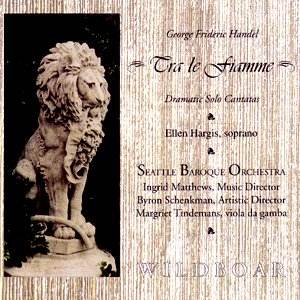This recording, whose title is somewhat deceptive,
contains much more than "Dramatic solo cantatas". It features
four cantatas from Handel's early years in Rome, but also a selection
of instrumental works: an Overture in D, which may be a true version
of one of his Opus 3 Concerti Grossi; a Violin Concerto arranged
from a trio sonata; a Chaconne from an Organ Concerto arranged
for harpsichord and strings (an alternative approved by Handel);
and a Prelude for harpsichord.
This variety actually adds to the interest of
the disc, offering what is in essence a complete program of Handel's
music, showcasing a variety of forms and instruments. The heart
of the disc is naturally the cantatas: there are three of them,
all for soprano and small instrumental groups. Two of the cantatas
are for soprano and continuo, and the third, Tra le Fiamme, is
for soprano, bass viol, recorders, oboe, violins and continuo.
Solo cantatas depend entirely on the singer.
And listeners will like these works or not according to their
feelings about the soloist's voice. Soprano Ellen Hargis won me
over in the first notes of the aria Ah! Crudele in the
cantata Armido Abbandonata. This small work - which places
the singer almost alone, naked, her voice against the world -
is intimate and moving, and Hargis, in spite of the occasional
imperfect note, makes the music soar. Her voice is a rich and
earthy mezzo, her delivery is moving, and her tone excellent.
She uses vibrato tastefully, and shows her ability to cover a
wide range in the aria Col Apartir la bella Clori, in the
cantata Ah! che pur troppo e vero.
The cantata Tra le Fiamme is a well-known
work, and features some of Handel's finest music. Scored for many
more instruments than the other cantatas on this disc, the instrumental
colours are delightful and varied, and the original instruments
give this piece a beautiful tone. The obbligato viol part in this
work is demanding and attractive, but ends up being hidden in
the mix.
The musicians of the Seattle Baroque Orchestra
, here in their first recording, show their abilities both as
an orchestra, in the opening Overture in D major and the B-flat
major Violin Concerto, as well as when providing accompaniment.
They have excellent dynamic mastery, remaining in the background
when necessary and standing out when required. The balance between
the voice and instruments is ideal, and the recording is nearly
perfect - the only drawback is a bit too much reverb on soprano
Hargis's voice, making it sound just slightly artificial.
The disc ends with the quasi-obligatory Ombra
mai fu, from Xerxes, which is probably sung on every
Handel disc for soprano ever recorded. Hargis is excellent here,
but one gets tired of hearing the same song over and over. It
would have been much more fulfilling to end with the da capo aria
Tra le Fiamme rather than add three more minutes to the
disc to record the classical equivalent of Louie, Louie yet
again.
But this is an immensely satisfying disc, featuring
excellent musicians and a sensuous, moving soprano. A must for
Handelians.
Kirk McElhearn
